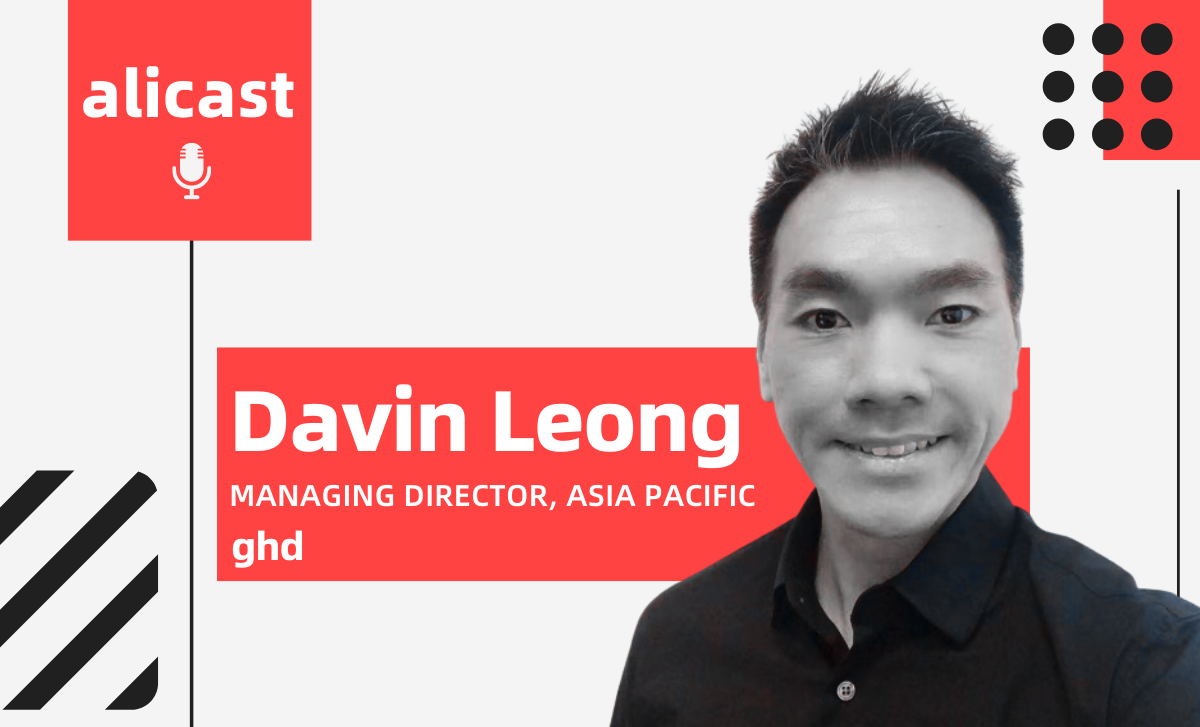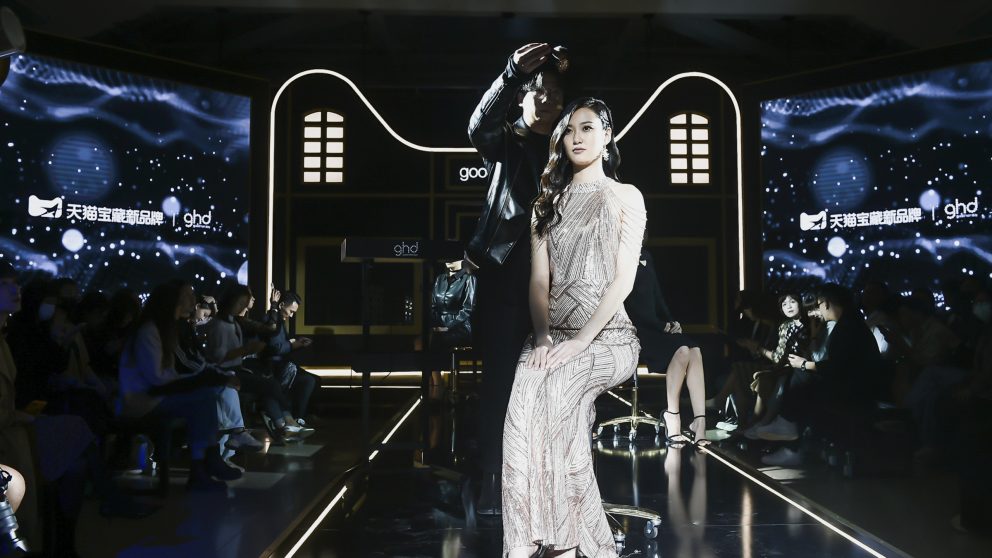
Listen and follow Alicast
Apple Podcasts | Spotify
Podcast Open
You’re listening to Alicast, a deep dive into innovative and emerging trends in e-commerce, online payments and digital entertainment, brought to you by Alibaba Group.
In this conversation, Alison Tudor-Ackroyd talks with Davin Leong, managing director for Asia Pacific at British hairstyling and appliance brand ghd, about China’s fast-growing hair care market and taking part in China’s largest shopping festival, 11.11.
They dig into what brands need to do to make a successful 11.11 debut.
Other topics covered include how and when to use Alibaba’s Hey Box to launch new products in the Chinese market.
Leong spoke with us from Shanghai where he is based. He has worked in China for over five years and in the beauty industry for over 15 years.
ghd was founded in Leeds in 2001 and launched in China with Alibaba’s Tmall Global in April. It sells roughly 2 million stylers every year.
In 2016, the brand became part of the Coty Professional Beauty division, but last year, Coty sold a majority stake in its professional business — including the Wella, Clairol and OPI brands, in addition to ghd — to global private equity firm KKR. As part of the transaction, Coty received net cash proceeds of about US$2.5 billion and still retains a 40 percent stake in the business.

Below is a transcript of this Alicast, edited for clarity and brevity
Alison Tudor-Ackroyd:
To kick off, could you tell us Davin, have you taken part in any shopping festivals in China?
Davin Leong:
First of all thanks for having me on the show. To answer your question, I’ve definitely been involved in a lot of these major shopping festivals in China. The obvious one that comes to mind would be the 6.18 shopping festival. And then obviously the logical one is 11.11. These two are huge shopping festivals and huge shopping occasions for Chinese consumers. Why? Because a lot of brands take the opportunity to showcase their latest and greatest, and of course there are value-added incentives for consumers to make purchases. You can certainly see that the whole consumer market leading up, to whether it is 6.18 or 11.11, the months, the weeks leading up to these two shopping windows, there’s just a lot of excitement.
Brands obviously engage the media, trying to get a lot more awareness out prior to the start of the shopping festival. So, for ghd we’ve partnered up with Tmall very closely on these from its infancy stage with Tmall Global, starting in 2018 and more recently, when we first started our Tmall China business. We also participated in the 6.18 shopping festival. So really working closely with Tmall to really bring more excitement to the Chinese consumers and also more excitement to the ghd consumers as well.
Alison Tudor-Ackroyd:
How far in advance do you start planning for a major shopping festival?
Davin Leong:
It takes months to really put something compelling together. And it’s not just a one-sided initiative, meaning it’s not just a brand but at the same time, it’s not just Tmall, just to quote an example. It’s really a partnership, by which I mean both sides need to really strategize, really put together a compelling commercial offer at the same time, and to really put in place a strong media campaign.
And these things do take a little bit of strategizing, a little bit of planning in terms of how you want to allocate your resources accordingly. So, for example, for Double 11 it may be just November, but every year the expectation changes, and it’s getting a lot sooner for brands, for consumers to start to get interested in what’s coming on the 11th of November.
We start to plan as early as June, July. So, it seems a little bit odd that you have a 6.18 promotion and straight after that, you’re really starting to plan what’s coming up on November 11. So, we participate in many things, from, for example, a smaller shopping occasion in September, where it’s arguably a testbed to see if you have got your brand strategy as well as your commercial strategy right. And if you have, happy days.
Tmall will share with you a little bit more in terms of what’s to come from October, the early part of November, and you start to strategize a little bit more in terms of your media activations. And if you don’t, then obviously there’s a different conversation where you have to very quickly start to make some adjustments so that you’re able to then course correct and make sure that you have all your ducks lined up to ensure that you have the right engagement and the right visibility in arguably a very competitive environment during a very key shopping window.
So yeah, it takes a good number of months of planning, and sometimes you would also require to plan as far ahead as 12 to 18 months out. Largely because you’re not just the only player in any given category. As brands, we have a responsibility to pitch a little bit ahead, excite our customers in Tmall to see what’s coming up. Whether there’s an innovation for example, or a huge media campaign leading up to November 11. So, it takes a lot of planning and it’s not just a simple activation just like what we have experienced 20 years ago when you’re participating in a huge brick-and-mortar shopping festival. Today it’s different, for sure.
Alison Tudor-Ackroyd:
How has the coronavirus pandemic impacted merchants in their planning for 11.11. Has it made supply-chain management and even more advanced planning ahead of a major shopping festival even more critical?
Davin Leong:
Absolutely so, because I don’t think there’s one brand, one company, one country that has not felt the effects of the pandemic from a supply chain point of view. So, certainly, I think what it really requires us as a brand to do is to be very, very close to the market, very, very close to our customers and very close to our consumers as well. So I think in many ways, it adds a little bit more color to what I said earlier in terms of having that forward planning, you know taking months ahead in terms of planning and an arrangement to make sure that you have adequate resources in place, adequate inventory and also at the same time planning together with Tmall, for example, in terms of what is to come. Tmall’s obviously our strategic partner.
We certainly want to make sure that all activations are done to a level that both sides are [happy]. We certainly place a lot of emphasis on execution. So we certainly need to manage our inventory a lot better. In doing so, we really need to have a long way off in terms of managing our supply chain and making sure that we have adequate stocks to fulfill the demands of the Chinese consumer.
Alison Tudor-Ackroyd:
Can you tell us a little bit about what you’ve got planned for 11.11. You’ve recently had a product launch, are you going to be building on that momentum?
Davin Leong:
We just came out of a huge collaboration with Tmall, where we participated in Hey Box, Xiao Hei He in Chinese, Was a joint collaboration between Tmall and ghd, where we took the opportunity to introduce what we really term as a game-changer in the styler market in the hairstyle market, where we launched young ghd unplugged, which is a cordless hair styler. We utilized this as a huge event that helped us to showcase what the brand stands for. And at the same time also what Tmall is able to bring to the Chinese market effectively new, innovative products to the Chinese market.
Obviously, there’s a lot of planning behind this and we are absolutely excited in terms of the results so far, but as the age-old saying goes, the easy part has been done, meaning, having a physical event. The challenging part is how do we sustain the interest of a Chinese consumer. And therefore, we have a longer-term strategy in terms of our media, a longer-term strategy in terms of our partnership with Tmall. So, we have activities in October that will help us to continue to drive engagement, building brand awareness, leading up into November 11, where we will come back once again, with the unplugged story and the proposition, and at the same time, putting together some of our key blockbuster products for example, platinum plus, which is our cream-of-the-crop hair styler. And bringing out the whole story of what ghd stands for, which is obviously, playing in the premium sector of the market, being able to provide consumers with a broad dimension in terms of their beauty hair needs.
So, we’ll be bringing out a lot more commercial offers to consumers, but more importantly, it’s to really showcase what the brand stands for, which is obviously about hair. We work with professional stylists, we are a trendy brand in a trendy business where we know all things about trends, hair and our partnerships with celebrities, influencers and the like. We will be obviously leveraging a lot of our partnerships and influences to bring the story out to the consumers particularly during November 11.
Alison Tudor-Ackroyd:
Last question from me. I think the world is intrigued by what’s happening in China’s e-commerce market more broadly. And you’ve been in China many years now. I’d be interested to hear what your key learning is about how Chinese shoppers behave and how brands such as ghd have to have to react to the market and what can executives and the rest of the world learn from this shopping behavior that’s going to be seen writ large during 11.11.
Davin Leong:
We have to recognize that the Chinese consumers of today are certainly more demanding. They’re certainly more discerning and certainly more affluent. So, they are more well-read, traveled, more exposed. So, if you put all of these things together, they are certainly more demanding. So, what it means is for brands like ourselves, we have to be very, very clear in terms of who we are and how do we as a brand relate to the Chinese consumer. So, having the conversation with the brand, it’s more important than ever before by which, I mean, again, it’s is no longer applicable where you have a good product and you think that it’s an important brand from somewhere outside of China.
And it works, it doesn’t. Chinese consumers are certainly, as I said, more demanding, and we certainly need to answer a lot of questions to their needs and wants. The world of digital has already given them more access to information in terms of what brands are and what products are. So, we certainly need to be very strong and authentic in terms of who we are and how are we are able to provide the relevant and right products to meet consumer expectations. I think beyond that, it’s also having the appreciation in terms of how fast and rapid the market is. So really having that ability to be nimble agile, flexible in terms of how we go about doing business, how we go about engaging consumers at every touchpoint.
Consumers these days are very mobile, right? Everything to them, it’s on their mobile device. So, whether is it from their mobile e-payments or how do they interact and communicate with their friends, colleagues, et cetera, the social engagements are all done through the device. So, we need to be very present you know to the consumers and also understanding, you know, different types of consumers in different types of different parts of their journey and the relationship with the brand. So, having that ability to read and understand, and be very targeted to who we want to speak to and how we want to speak with the different consumers is also very critical. And therefore that’s where the benefit of working with Tmall comes into play, where we are able to assess, you know, data, consumer data that obviously the Tmall system is able to provide for us to be able to chart our course very tactically, but at the same time strategically, that will help us to make more informed choices.
And at the same time, be more optimal in terms of our engagement and investments, because at the end of the day, for brands like ourselves and also in the interest of Tmall, despite doing everything that I’ve spoken of about brand engagement, it’s really about creating the traffic into the stores and making sure that we do that conversion and ultimately registering the transaction. Right. So really understanding the consumer journey and being relevant at every single touchpoint of the consumer. I think it’s very critical. And whether on a strong shopping festival like November 11, or just on a day-to-day level, I think the ability to work very closely with a partner like Tmall it’s very, very important, particularly for a brand like ours.
We are not a mass brand where we have a wide distribution. We are selective in terms of where our brands will be present. And we obviously chose to work with Tmall very closely for reasons as I shared earlier. But also, as an extension to that Tmall actually understands beauty. And Tmall has obviously the experience and the credibility in terms of building brands. And therefore, you know, we, we certainly see the benefit of actually working very closely with Tmall as a strong partner. And I think the results that we have seen in a very short period of time have proven that this decision is the right one.
Alison Tudor-Ackroyd:
Thank you. Your insights are greatly appreciated. Thank you for your time. It’s been a pleasure having you here today.
Davin Leong:
Pleasure’s all mine. Thank you for the chat and lovely to have this time with you.
Listen and follow Alicast
Apple Podcasts | Spotify
“Alicast” is a production of Alizila, the corporate newsroom of Alibaba. It’s produced by Monica Suk and edited by Alison Tudor-Ackroyd. If you’re in a podcast app already, please follow “Alicast”. If you’re listening on Alizila’s website and want each new episode of “Alicast” delivered to you as they’re published, download any podcast app, then search for “Alicast” to follow the show. Thank you for listening.
To receive the latest news directly in your inbox, sign up for the weekly Alizila newsletter




